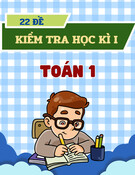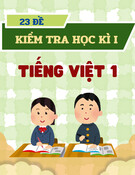
SỞ GIÁO DỤC & ĐÀO TẠO TPHCM
TRƯỜNG THPT HIỆP BÌNH
ĐỀ THI GIỮA KỲ MÔN TIẾNG ANH KHỐI 12
Thời gian làm bài: phút;
Mã đề thi 359
Họ và tên thí sinh:..........................................................................
Số báo danh:...................................Phòng thi............................
Pick out the word whose underlined part is pronounced differently from that of the other words:
Câu 1: A. called B. divided C. followed D. listened
Câu 2: A. contain B. culture C. picture D. feature
Pick out the word that has the stressed pattern differently from that of the others:
Câu 3: A. beauty B. confide C. maintain D. police
Câu 4: A. family B. appearance C. confidence D. hospital
Choose the word, phrase or utterance (A, B, C, or D) that best completes the sentence:
Câu 5: Mr. Hawk told me that he would give me his answer __________ .
A. the previous day B. the day before C. tomorrow D. the following day
Câu 6: Fee-paying schools, often called "independent schools", "private schools" or “__________ schools"
A. secondary B. public C. college D. primary
Câu 7:
He was always __________ to his father's wishes.
A. obedient B. obediently C. obey D. obedience
Câu 8: By the end of next year, Mr. Park __________for this company for 35 years.
A. will work B. will have worked C. will be working D. has worked
Câu 9: Mr. Pike __________English at our school for 20 years before he retired last year.
A. was teaching B. is teaching C. has been teaching D. had been teaching
Câu 10: In Vietnam a school year lasts for nine months and is divided __________ two terms.
A. on B. from C. into D. to
Câu 11: We often __________to show that we agree on something
A. shake B. attract C. nod D. wave
Câu 12: What a beautiful dress you are wearing! - “__________”
A. Not at all! B. Thank you. That is a nice compliment
C. Never mind! D. You’re welcome
Câu 13: Someone says that a happy __________ should be based on love.
A. marriage B. marry C. merry D. marital
Câu 14: Most of schools will be holding the end-of-term test before the New Year vacation __________.
A. would begin B. begins C. began D. will begin
Câu 15: Buckingham Palace is a major tourist__________ .
A. attraction B. attract C. attractively D. attractive
Câu 16: Upon returning from the class, _________.
A. the mail box had a letter in it. B. a letter was in the mail box.
C. a letter was found in the mail box. D. he found a letter in the mail box.
Câu 17: We are a very __________ family and support each other through any problems.
A. close-knit B. hard C. well-being D. fun
Câu 18: He promised to send me a postcard, but he__________
A. never did B. didn’t no send C. would never D. did never send
Câu 19: You are old enough to take _______ for what you have done.
A. responsible B. responsibility C. irresponsible D. responsibly
Câu 20: Mary: “I didn’t know you could play the guitar so well, Julia.”
– Julia: “_________.”
A. That’s all right B. I’m glad you enjoyed it
C. I like it D. That’s nice
Câu 21: The children were excited __________ opening their presents.
A. with B. from C. about D. in
Câu 22: Cindy __________that I could keep her book for another two days.
Trang 1/4 - Mã đ thi 359ề

A. told B. said me C. told me D. said to
Câu 23: If the tree hadn't been so high, he ____________ it up to take his kite down.
A. climb B. is climbing C. could have climbed D. climbed
Câu 24: We sent some flowers as an __________of sympathy to the parents of the child.
A. expression B. gesture C. action D. symbol
Câu 25: All of the food __________ sold by the time we arrived at the restaurant.
A. had been B. was C. was being D. has been
Câu 26: We can use _________ and _________ forms of communication to attract one’s attention.
A. silence / noise B. verb / adverb C. verbal / non-verbal D. gentle / impolite
Mark the letter A, B, C, or D on your answer sheet to indicate the word phrase that is OPPOSITE in
meaning to the underlined part in the following questions.
Câu 27: “That is a well-behaved boy whose behaviour has nothing to complain about”
A. behaving nice B. good behavior C. misbehaved D. courteous
Câu 28: There is growing concern about the way man has destroyed the environment
A. speculation B. worry C. attraction D. ease
Choose the word(s)CLOSEST in meaning to the underlined word(s) in the following questions.
Câu 29: “It is a really difficult matter to decide how to solve now. I will need time to think it over”.
A. to make up for it B. to make it better C. to think out of time D. to sleep on it.
Câu 30: Love is supposed to follow marriage, not precede it.
A. willing to stop having something you want B. having a duty to do something
C. tell somebody about something very private or secret D. happen or exist before
Choose the underlined word or phrase (A, B, C, or D) in each sentence that needs correcting:
Câu 31: The National Curriculum is set by the government and must follow in all state schools.
A B C D
Câu 32: In my opinion, I think a happy marriage should be based on true love.
A B C D
Câu 33: The most excited thing was that I didn’t have to explain to my parents where I was going.
A B C D
Câu 34: In spite of the tenants’ objections, the apartment manager decided to rise the rent by forty dollars per
month.
A B C D
Câu 35: The teacher told his students to not make noise when he was teaching.
A B C D
Read the passage below carefully and choose the correct answer A, B, C, or D
You can usually tell when your friends are happy or angry by the looks on their faces or by their actions.
This is useful because reading their emotional expressions helps you to know how to respond to them.
Emotions have evolved to help us respond to important situations and to convey our intentions to others. But
does raising the eyebrows and rounding the mouth say the same thing in Minneapolis as it does in
Madagascar? Much research on emotional expressions has centered on such questions.
According to Paul Ekman, the leading researcher in this area, people speak and understand
substantially the same “facial language”. Studies by Ekman’s group have demonstrated that humans share a
set of universal emotional expressions that testify to the common biological heritage of the human species.
Smiles, for example, signal happiness and frowns indicate sadness on the faces of people in such far- flung
places as Argentina, Japan, Spain, Hungary, Poland , Sumatra ,the United States, Vietnam, the jungles of
New Guinea , and the Eskimo villages north of Artic Circle. Ekman and his colleagues claim that people
everywhere can recognize at least seven basic emotions: sadness, fear, anger, disgust, contempt, happiness,
and surprise. There are, however, huge differences across cultures in both the context and intensity of
emotional displays – the so called display rules. In many Asian cultures, for example, children are taught to
control emotional responses – especially negative ones- while many American children are encouraged to
express their feelings more openly. Regardless of culture, however, emotions usually show themselves, to
some degree , in people’s behavior. From their first days of life, babies produce facial expressions that
communicate their feelings.
The ability to read facial expressions develops early, too. Very young children pay close attention to
facial expressions, and by age five, they nearly equal adults in their skill at reading emotions on people’s
faces. This evidence all points to a biological underpinning for our abilities to express and interpret a basic
Trang 2/4 - Mã đ thi 359ề

set of human emotions. Moreover, as Charles Darwin pointed out over a century ago, some emotional
expressions seem to appear across species boundaries. Cross - cultural psychologists tell us that certain
emotional responses carry different meanings in different cultures. For example, what emotion do you
suppose might be conveyed by sticking out your tongue? For Americans, this might indicate disgust, while in
China it can signify surprise. Likewise, a grin on an American face may indicate joy, while on a Japanese face
it may just as easily mean embarrassment. Clearly, culture influences emotional expressions.
Câu 36: According to the passage, we react to others by __________.
A. observing their looks B. looking at their faces
C. watching their actions D. observing their emotional expressions
Câu 37: Many studies on emotional expressions try to answer the question whether __________.
A. raising the eyebrows has similar meaning to rounding the mouth.
B. different cultures have similar emotional expressions.
C. eyebrow raising means the same in Minneapolis and Madagascar.
D. rounding the mouth has the same meaning in Minneapolis and Madagascar.
Câu 38: Paul Ekman is mentioned in the passage as an example of ___________.
A. researchers who can speak and understand many languages
B. investigators on universal emotional expressions
C. lacked many main ingredients
D. researchers on universal language
Câu 39: The phrase “ this evidence” in paragragh 3 refers to __________.
A. a biological underpinning for humans to express emotions
B. the fact that children can control their feelings
C. the fact that children are good at recognizing others’ emotions
D. human facial expressions
Câu 40: The best title for the passage is __________.
A. ways to control emotional expressions
B. review of research on emotional expressions
C. Human habit of displaying emotions
D. cultural universals in emotional expressions
Choose the word or phrase (A, B, C, or D) that best fits the blank space in the following passage
Most Americans eat three meals (41)______ the day: breakfast, lunch, and dinner. Breakfast begins
between 7:00 and 8:00am, lunch between 11:00 am and noon, and dinner between 6:00 and 8:00 pm. On
Sundays "brunch" is a (42)______ of breakfast and lunch, typically beginning at 11:00 am. Students often
enjoy a "study break" or evening snack around 10:00 or 11:00 pm. Breakfast and lunch tend to be light meals,
with only one (43)______ Dinner is the main meal.
(44)______ breakfast Americans will eat cereal with milk which are often mixed in a bowl, a glass of
orange juice, and toasted bread or muffin with jam, butter, or margarine. Another common breakfast meal is
scrambled eggs or an omelet with potatoes and breakfast meat (bacon or sausage). People who are on diet
eat just a cup of yogurt. Lunch and dinner are more (45)______ .When eating at a formal dinner, you may be
overwhelmed by the number of utensils. How do you tell the difference between a salad fork, a butter fork,
and a dessert fork? Most Americans do not know the answer either. But knowing which fork or spoon to use
first is simple: use the outermost utensils first and the utensils closest to the plate last.
Câu 41: A. for B. in C. on D. during
Câu 42: A. addition B. connection C. combination D. attachment
Câu 43: A. course B. dish C. food D. goods
Câu 44: A. At B. With C. For D. In
Câu 45: A. variety B. varied C. vary D. variously
WRITING:Finish each of the following sentences in such a way that it meams the same as the first one.
Câu 46:His wife made him stay at home
He ................................................................................................
Câu 47: “Would you like to come to my 18th birthday party?” he asked me.
He invited ………………………………………………………………………………..
Câu 48: I have not played football since 2008.
The last time………………………………………………………………………………
Câu 49: Nothing is done, so I can’t come home right now.
If………………………………………………………………………………
Câu 50: I regret not learning English when I was at high school.
I wish………………………………………………………………………………
--------------------------------
----------------------------------------
Trang 3/4 - Mã đ thi 359ề

----------- HẾT ---------
Trang 4/4 - Mã đ thi 359ề






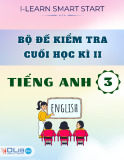
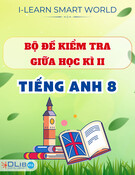

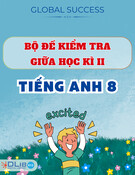
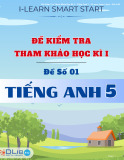

![Đề thi Tiếng Anh có đáp án [kèm lời giải chi tiết]](https://cdn.tailieu.vn/images/document/thumbnail/2025/20250810/duykpmg/135x160/64731754886819.jpg)
